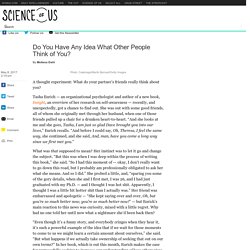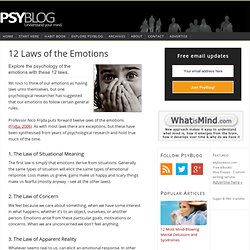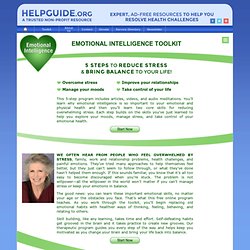

Scientists discover there are 27 DIFFERENT emotions. Scientists have discovered that the range of emotions humans experience is much wider than previously thought.

While it was originally thought we feel just six emotions, researchers at UC Berkeley found 27 distinct human emotions and have displayed them on an interactive map. In addition to happiness, sadness, anger, surprise, fear, and, disgust, they also determined confusion, romance, nostalgia, sexual desire, and others to be distinct emotions. Scroll down for video and click here for an interactive version of the map. Do You Have Any Idea What Other People Think of You? A thought experiment: What do your partner’s friends really think about you?

Tasha Eurich — an organizational psychologist and author of a new book, Insight, an overview of her research on self-awareness — recently, and unexpectedly, got a chance to find out. She was out with some good friends, all of whom she originally met through her husband, when one of those friends pulled up a chair for a drunken heart-to-heart. “And she looks at me and she goes, Tasha, I am just so glad Dave brought you into our lives,” Eurich recalls. Mindfulness of Emotions. How Emotionally Intelligent Are You? What makes some people more successful in work and life than others?

IQ and work ethic are important, but they don't tell the whole story. Our emotional intelligence -- the way we manage emotions, both our own and those of others -- can play a critical role in determining our happiness and success. Plato said that all learning has some emotional basis, and he may be right. The way we interact with and regulate our emotions has repercussions in nearly every aspect of our lives. To put it in colloquial terms, emotional intelligence (EQ) is like "street smarts," as opposed to "book smarts," and it's what accounts for a great deal of one's ability to navigate life effectively.
12 Laws of the Emotions. Explore the psychology of the emotions with these 12 laws.

We tend to think of our emotions as having laws unto themselves, but one psychological researcher has suggested that our emotions do follow certain general rules. Professor Nico Frijda puts forward twelve laws of the emotions (Fridja, 2006). As with most laws there are exceptions, but these have been synthesised from years of psychological research and hold true much of the time. 1. The Law of Situational Meaning The first law is simply that emotions derive from situations. 2. Developing Emotional Awareness: Recognizing & Harnessing Your Emotions. We often hear from people who feel overwhelmed by stress, family, work and relationship problems, health challenges, and painful emotions.

They’ve tried many approaches to help themselves feel better, but they just can’t seem to follow through, or what they’ve done hasn't helped them enough. If this sounds familiar, you know that it’s all too easy to become discouraged when you’re stuck. The problem is not willpower—all the willpower in the world won’t matter if you can’t manage stress or keep your emotions in balance. The good news: you can learn these important emotional skills, no matter your age or the obstacles you face. That’s what this free online program teaches. Are you emotionally intelligent? Here’s how to know for sure. When emotional intelligence (EQ) first appeared to the masses, it served as the missing link in a peculiar finding: people with average IQs outperform those with the highest IQs 70 per cent of the time.

This anomaly threw a massive wrench into the broadly held assumption that IQ was the sole source of success. Decades of research now point to emotional intelligence as being the critical factor that sets star performers apart from the rest of the pack. The connection is so strong that 90 per cent of top performers have high emotional intelligence. Emotional intelligence is the “something” in each of us that is a bit intangible. It affects how we manage behavior, navigate social complexities, and make personal decisions to achieve positive results.
The Seven Characteristics of Emotionally Strong People. 18 Behaviors of Emotionally Intelligent People. When emotional intelligence (EQ) first appeared to the masses, it served as the missing link in a peculiar finding: people with average IQs outperform those with the highest IQs 70 percent of the time.

This anomaly threw a massive wrench into the broadly held assumption that IQ was the sole source of success. Decades of research now point to emotional intelligence as being the critical factor that sets star performers apart from the rest of the pack. The connection is so strong that 90 percent of top performers have high emotional intelligence. Emotional intelligence is the "something" in each of us that is a bit intangible. It affects how we manage behavior, navigate social complexities, and make personal decisions to achieve positive results. Despite the significance of EQ, its intangible nature makes it difficult to measure and to know what to do to improve it if you're lacking.
You have a robust emotional vocabulary. You're curious about people. You embrace change. You disconnect. Emotional Intelligence Quiz. Signs That You Lack Emotional Intelligence. Executive Summary Often, emotional intelligence is the key differentiator between a star performer and the rest of the pack, yet many never embrace the skill for themselves.
